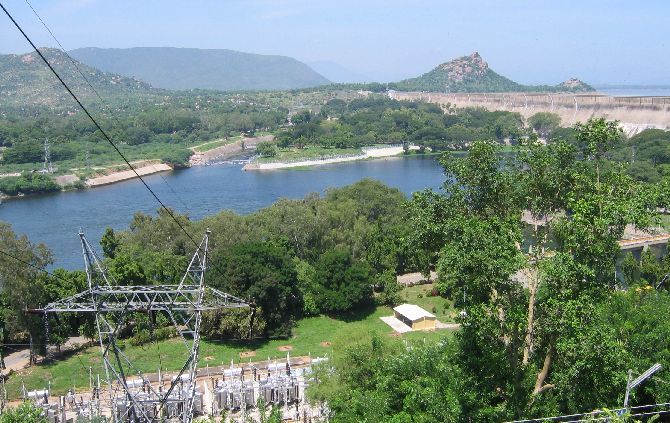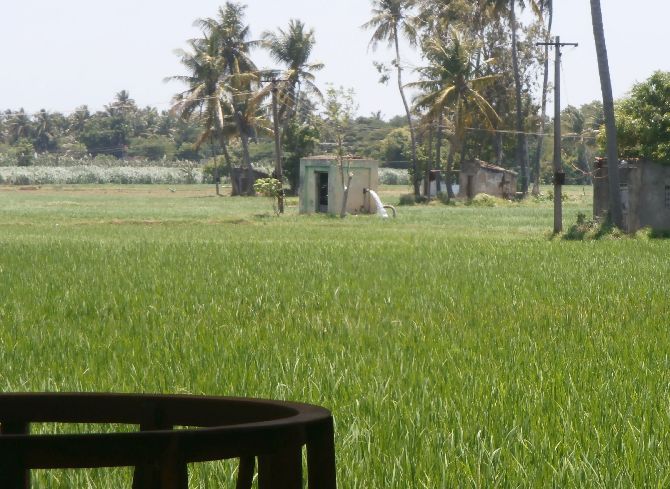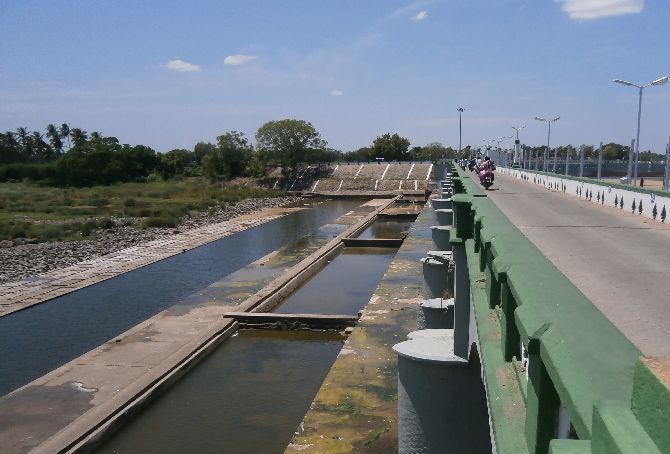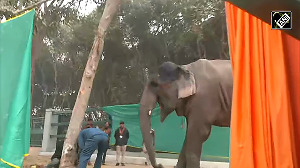
Rediff.com's A Ganesh Nadar travels to the Cauvery delta in Tamil Nadu and finds farmers there resigned to their fate.
Even as Tamil Nadu and Karnataka battle it out in the country's highest court for their share of the waters of the Cauvery river, the farmers in the river's delta in Tamil Nadu have little hope of the water reaching them in time to save their crops.
The farmers in the Cauvery delta have no faith in Karnataka keeping its promises.
Thanjavur is Tamil Nadu's rice bowl and the farmers there are at the mercy of Karnataka each time the monsoon fails. Only 10 per cent of the land this year was cultivated for the Kuruvai (short-term) crop.
Aruloli Varman, a farmer in Ammanpettai village, has 20 acres of wet land. "There are 20 more days to harvest. I am praying my wells don't run dry or become salty. If the promised Cauvery water comes, then I have no problems. If not, we are at God's mercy."
He says he has always been dependent on his wells. "The Cauvery is not dependable as Karnataka will never consider our needs."
If the Cauvery water comes, he says his wells will be recharged. He does not think he can do any farming with the Cauvery water though there are canals to carry the water to his fields.
Though this area is located away from the sea another farmer says the ground water turned salty after the December 26, 2004 tsunami. It took 10 years for things to return to normal.
"Only Karnataka's farmers will understand our pain when we see our crops dying," says Varman, "but they have no say in the matter. Farmers in Karnataka did not agitate. It was the youngsters who were rioting."

The Tamil Nadu government has asked the farmers not to plant their regular seeds which take 120 days to harvest, but they should use special seeds that the government is selling. These seeds are ready for harvesting in 100 days. 20 days makes a big difference in the Cauvery delta.
At the moment ground water is available at 70 feet in Ammanpettai. The village has 4,500 acres of wetland. There are 15 lakes in this village which are dependant on Cauvery water. At the moment all of them are dry. No water in the lakes means the ground water is not replenished.
Since there is no water here, farm labourers have gone to work in the construction industry. Only the older farm labourers remain, the younger generation has migrated to cities across the country to work in factories which are more dependable than the Cauvery and the rains.
To augment his income, Varman also sells seeds and pesticides. He grows rice and also sugarcane sometimes.
When farming happens here, work is available for all. Women are paid Rs 120 for five hours' work and men are paid Rs 300.
Saranathan has nine acres of land. He has borewells and water is available at 130 feet on his land. The electicity is not dependable during the day, he says, adding that he gets six hours of supply at night, so he stays awake to make sure his paddy gets water.
"The Cauvery water will only replenish the ground water," he says, "It will not be enough for another crop."
The farmers agree that river water yield is better than ground water as the river water carries silt and minerals with it. "When we use ground water we have to use more costly fertiliser per acre," he adds.
In the Cauvery delta one acre of land is expected to yield between 18 to 27 quintals of paddy. "In the Kuruvai (short-term) crop you can expect an average yield of 20 quintals per acre. For the Samba (crops grown between August and January) crop the yield will drop to 15 quintals per acre," Saranathan adds.

Panjabakeshan, another farmer, has five acres of land. He is cultivating his land with the help of two borewells, where water is at a depth of 70 feet.
"They released some water for Aadi Perukku (a religious festival). That helped replenish the water table otherwise my wells would have gone dry. If there is no water in the Cauvery for two consecutive years, all the wells will dry up," he says.
"We have been having this water problem since 1982," he adds. "Only when there is surplus water, the Karnataka government lets water flow into Tamil Nadu. When there is a shortage, the problem starts."
Jagan Arokiyasamy is a computer engineer who was employed at a software company. When his father died, he returned to the village to look after his family's farm.
He has six acres of land on which he has planted the Kuruvai crop. There are two borewells on his land and the water table is at 40 feet. "When the Cauvery river is flowing, the water level is good. Now it is very low. If river water does not come, we cannot have another crop. The water in the well is not enough for the Samba crop."
"Water in the well is good only when the river is flowing," he adds. "It turns salty in the absence of river water."
Sannanallur village is located in Thiruvarur district, which is also in the Cauvery delta. M Samynathan has 15 acres of land. He has prepared the land to plant the Samba crop.
"I will start planting when it rains. I have no hope of the Cauvery water coming. Last year the Cauvery water was available only for the Samba crop. This year we have already lost the Kuruvai season. There is no water so far. I am hoping the river water is enough for half my needs," he says.
"The other half I can supplement with well water. Now the water is salty. We sit idle when there is no water. Some farmers grow cotton which does not require as much water as paddy," he adds.
Raja Marimuthu, a farm labourer, earns Rs 400 a day when he works in the fields. "There is no industry in the Cauvery delta. When there is no water I work in the construction industry. I also go for NREGA work, but there the pay is very low (Rs 120 per day). I also cut trees and fence farmland," he said.
T Pandian owns 20 acres of farmland and a shop that sells fertilisers and pesticides. "I have two borewells," he says, "but both have turned salty so I cannot do any farming. This happened five years ago. Before that the water was good. I have planted seeds with salt water. Hopefully, the Cauvery water will come or it will rain as salt water is not good for the crop."
"Transplanting will happen only if it rains or the Cauvery water comes, otherwise the seedlings will die," he says.
"Many of our youth have gone abroad," says Pandian. "The money they send is keeping our villages alive. Otherwise, we would have been reduced to begging by now."











 © 2025
© 2025